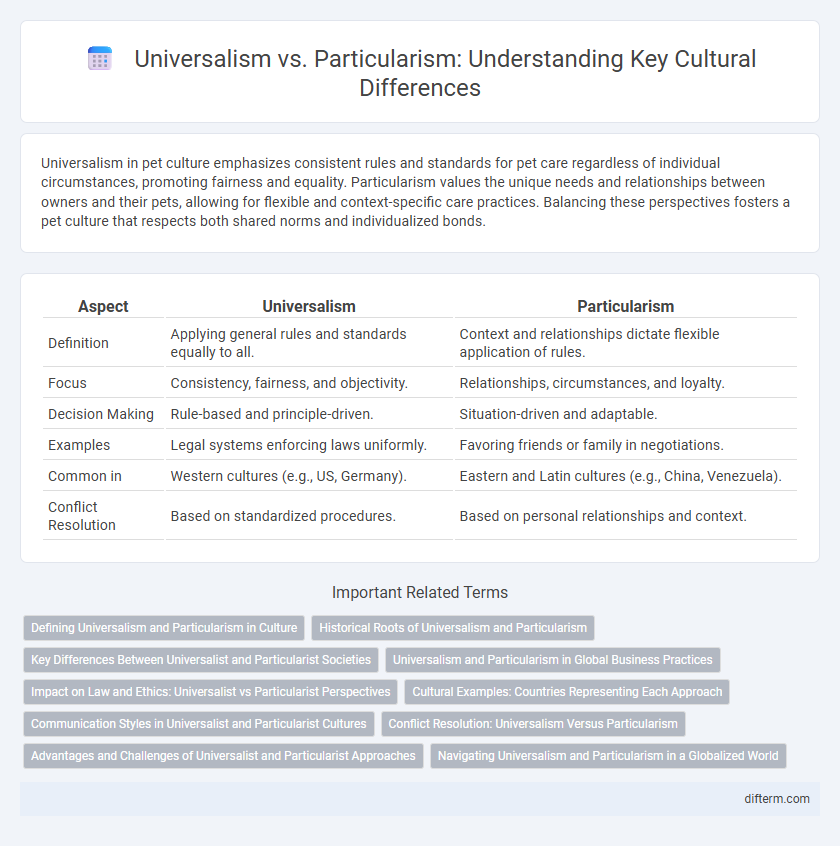Universalism in pet culture emphasizes consistent rules and standards for pet care regardless of individual circumstances, promoting fairness and equality. Particularism values the unique needs and relationships between owners and their pets, allowing for flexible and context-specific care practices. Balancing these perspectives fosters a pet culture that respects both shared norms and individualized bonds.
Table of Comparison
| Aspect | Universalism | Particularism |
|---|---|---|
| Definition | Applying general rules and standards equally to all. | Context and relationships dictate flexible application of rules. |
| Focus | Consistency, fairness, and objectivity. | Relationships, circumstances, and loyalty. |
| Decision Making | Rule-based and principle-driven. | Situation-driven and adaptable. |
| Examples | Legal systems enforcing laws uniformly. | Favoring friends or family in negotiations. |
| Common in | Western cultures (e.g., US, Germany). | Eastern and Latin cultures (e.g., China, Venezuela). |
| Conflict Resolution | Based on standardized procedures. | Based on personal relationships and context. |
Defining Universalism and Particularism in Culture
Universalism in culture emphasizes applying consistent rules and standards across all situations to ensure fairness and equality, reflecting a preference for objective judgments and universal norms. Particularism values the importance of relationships, contexts, and unique circumstances, allowing flexible rules that adapt to specific individuals or groups. These cultural dimensions shape communication, decision-making, and conflict resolution by influencing whether societies prioritize uniformity or situational considerations.
Historical Roots of Universalism and Particularism
The historical roots of universalism trace back to Enlightenment ideals emphasizing equality, rationality, and universal human rights, shaping legal and cultural systems that promote standardized norms across societies. Particularism, deeply embedded in tribal and kinship-based societies, prioritizes context-specific relationships, customs, and obligations, reflecting diverse cultural identities and localized social contracts. These foundational differences influence contemporary cross-cultural interactions, governance, and ethical frameworks worldwide.
Key Differences Between Universalist and Particularist Societies
Universalist societies prioritize applying consistent rules and standards to all individuals regardless of relationships, emphasizing fairness and objective criteria. Particularist societies focus on context and relationships, adapting rules based on circumstances and personal connections to achieve harmonious outcomes. These cultural orientations influence legal systems, business practices, and social interactions by shaping expectations around loyalty, trust, and rule enforcement.
Universalism and Particularism in Global Business Practices
Universalism in global business practices emphasizes applying consistent rules and standards across all markets, promoting fairness and predictability in international transactions. Particularism prioritizes relationships and contextual factors, leading to flexible application of rules based on cultural, situational, or interpersonal considerations. Multinational companies must navigate these contrasting approaches to effectively manage cross-cultural negotiations, compliance, and partnership strategies.
Impact on Law and Ethics: Universalist vs Particularist Perspectives
Universalist perspectives in law emphasize consistent application of rules and ethical standards across all cases to ensure fairness and predictability. Particularist views prioritize context and relationships, allowing flexibility in legal judgments and ethical decisions based on situational factors. These differing approaches impact global business practices, influencing contract enforcement and cross-cultural negotiations.
Cultural Examples: Countries Representing Each Approach
Universalism is exemplified by countries like the United States and Germany, where rules and laws are applied consistently across all individuals regardless of relationships or circumstances. Particularism is prominent in nations such as China and Brazil, where social relationships and contextual factors influence the application of rules and decision-making. These cultural approaches shape business practices, legal frameworks, and interpersonal interactions within their respective societies.
Communication Styles in Universalist and Particularist Cultures
Universalist cultures emphasize clear, direct, and explicit communication, valuing rules and consistency in message delivery to ensure understanding across diverse groups. Particularist cultures prioritize context, relationships, and implicit cues, often using indirect communication styles where meaning is derived from the situation and interpersonal connections. These contrasting approaches influence negotiations, conflict resolution, and everyday interactions in global business and multicultural environments.
Conflict Resolution: Universalism Versus Particularism
In conflict resolution, universalism emphasizes applying consistent rules and principles regardless of the individuals involved, promoting fairness and predictability. Particularism prioritizes relationships and context, adapting solutions based on situational factors and personal connections to maintain harmony. Understanding the balance between universalism and particularism is crucial for effective negotiation strategies across diverse cultural settings.
Advantages and Challenges of Universalist and Particularist Approaches
Universalist approaches promote consistency, fairness, and clear expectations by applying uniform rules across diverse situations, which enhances transparency and reduces ambiguity in multicultural interactions. Challenges include potential rigidity and cultural insensitivity, as universalist norms may overlook unique local values and social contexts, leading to misunderstandings or resistance. Particularist approaches offer flexibility and cultural adaptability by prioritizing relationships and specific circumstances, fostering trust and cooperation, yet risk inconsistency and perceived favoritism that can complicate fairness and organizational standardization.
Navigating Universalism and Particularism in a Globalized World
Navigating universalism and particularism in a globalized world requires understanding the balance between applying global standards and respecting local customs. Businesses and individuals must adapt practices to align with universal ethical principles while acknowledging cultural specificities that influence communication and decision-making. Successfully managing this dynamic fosters cross-cultural collaboration and minimizes conflicts in international environments.
universalism vs particularism Infographic

 difterm.com
difterm.com